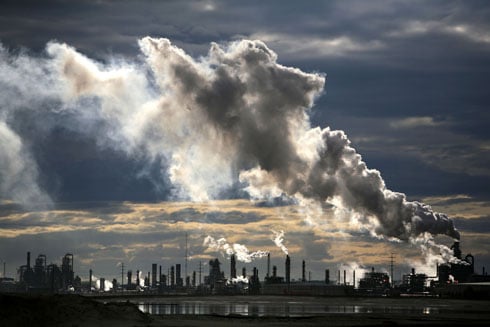Last year, as part of its review of the TransCanada Keystone XL pipeline planned to deliver dirty tar sands oil from Alberta to refineries in the Gulf of Mexico, the Environmental Protection Agency (EPA) found that the carbon emissions from Canadian oil sands crude would be approximately 82% greater than average US crude.
Tar sands oil producers, fossil fuel advocates and Canadian and Alberta politicians were understandably worried about the reputation of their dirty oil. To battle these new facts, these groups have actively engaged in a campaign to greenwash the tar sands by promoting it as “ethical oil”. They’ve even commissioned their own report by the Cambridge Energy Research Associates suggesting that emissions from tar sands oil were only 5-15% higher than traditional oil products.
So why should we be worried? For three reasons:
• Canada and the EU are in free trade negotiations hoping to conclude the Comprehensive Economic Trade Agreement (Ceta) by 2012 which could open EU markets to dirty tar sands oil and damaging efforts to curb global warming pollution;
• European Union (EU) decision-makers adopted a Fuel Quality Directive [pdf] in 2009 which mandates suppliers to reduce the carbon emissions from transport fuels 6% below 2010 levels by 2020 – and despite significant lobbying to the contrary – they are considering revising the directive to differentiate between oil types (and tar sands oil would be singled out);
• The European Commission asked Professor Adam Brandt from Stanford University to study oil sands carbon emissions and his report [pdf], just released, shows that over its lifecycle [pdf] (also referred to as “wells to wheels”), fuel from the tar sands have a 23% greater carbon footprint than most oils used in the EU – and definitively the European Commission will have to defend the Ceta and any watered down Fuel Directive.
Environmental advocates, according to the Guardian, strongly oppose the Ceta especially since the draft agreement has a clause which could permit corporations to sue states which bar them market penetration due to environmental regulations – effectively derailing European efforts to cut global warming pollution. Lawyer Steven Shrybman, who studied the draft agreement concluded:
“If Ceta fails to significantly improve on the norms for such trade agreements, it will only add to the serious impediments that now exist under Nafta [North American Free Trade Agreement] and WTO [World Trade Organisation] agreements to establishing effective measures to combat climate change.”
Although Alberta supplies very little oil to the EU, tar sands producers and their political allies are on edge fearing that their image will be further tarnished if Alberta crude is formally labeled a carbon-intensive fuel source. Danielle Droitsch from the Pembina Institute writes:
“The truth is, Canadian and Albertan officials are fighting tooth and nail to prevent oilsands being officially classified as a high-carbon fuel anywhere — the reason being that if a major body such as the European Union does so, it’ll be much harder for Canadian officials to continue claiming the oilsands are an environmentally responsible source of oil.”
According to The Tyee, since countries such as China and India have copied EU emissions standards, referring to tar sands oil as a heavy global warming polluter could harm the market growth for this dirty product. That is also the thinking of Albertan Energy Minister Ron Liepert who was dispatched two weeks ago to London and Brussels in order to lobby on behalf of the oil sands:
“The European Union is not currently a major market for Alberta’s oil sands products, but any legislation or tariffs adopted by the union’s government can serve as a model for individual nations around the world.”
With the facts in hand, once again, it is safe to say that Minister Liepert is right: “There is a spin campaign by government and industry and then there’s the truth.”
If you are interested in learning more, read The Tar Sands Long Shadow: Canada’s Campaign to Kill Climate Policies Outside Our Borders.
Subscribe to our newsletter
Stay up to date with DeSmog news and alerts






